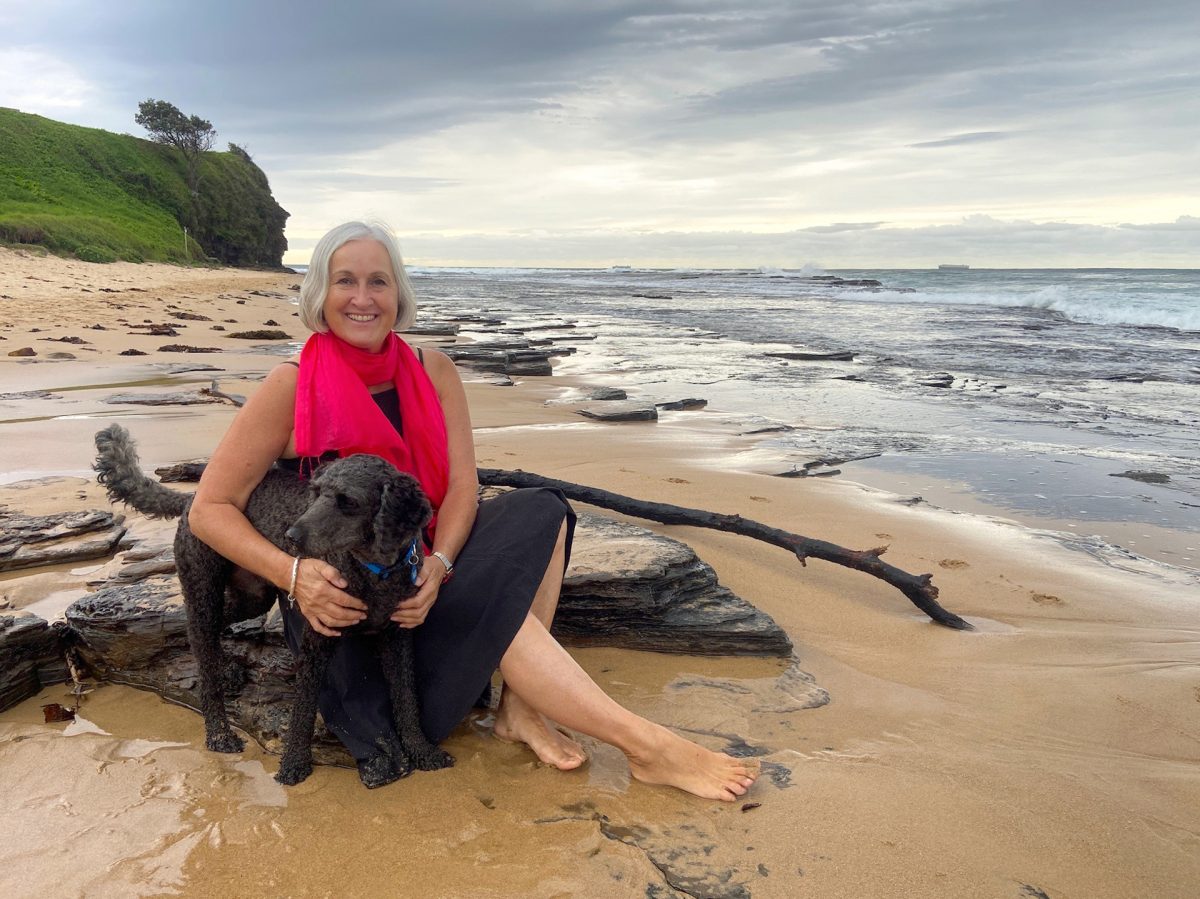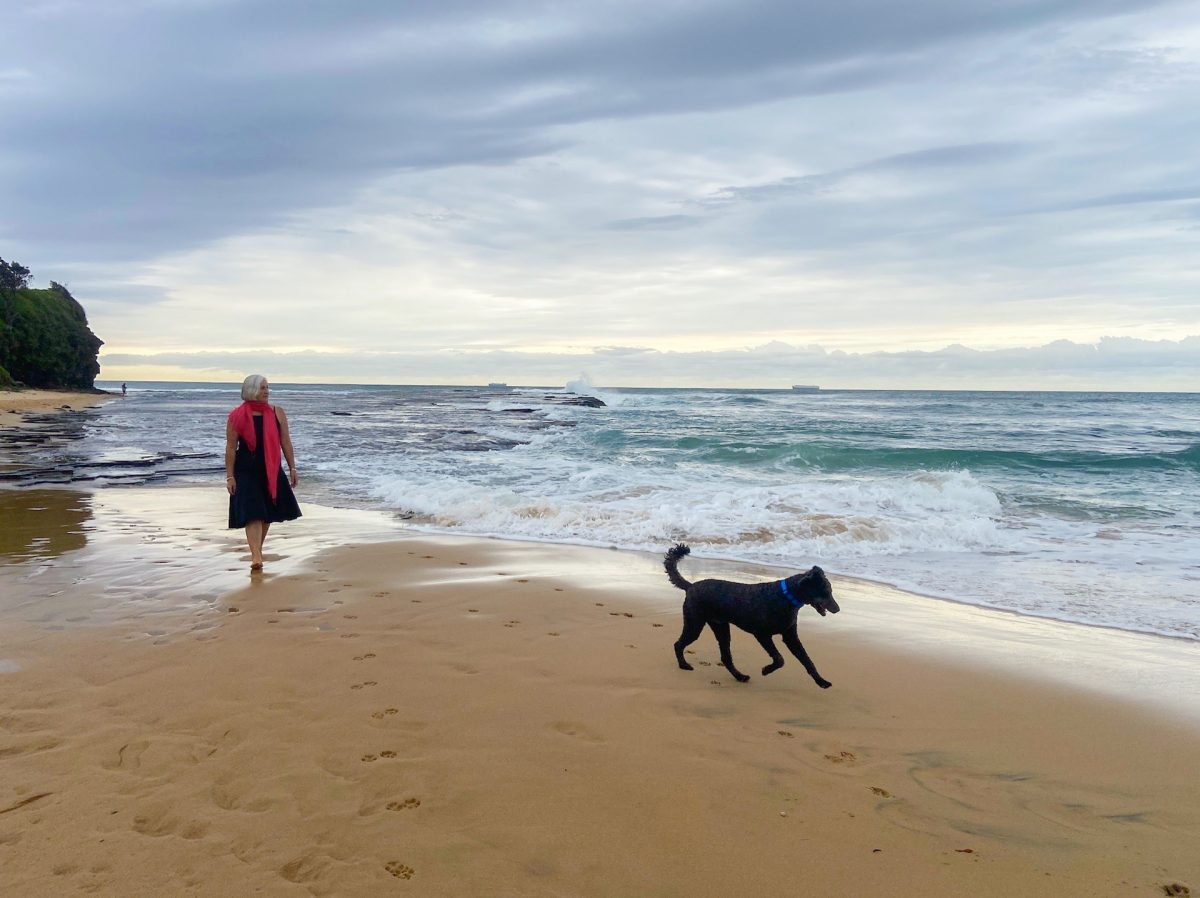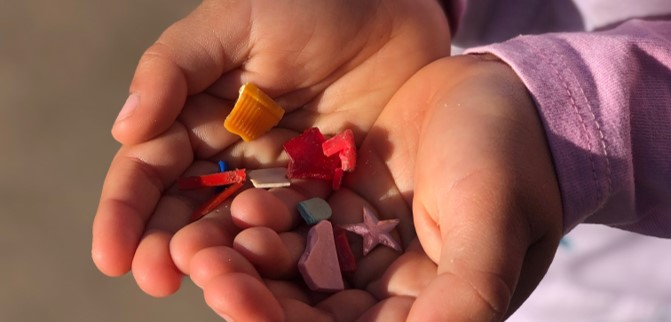
Susie Crick with her Tamaruke, Jet, on Sharkey’s Beach in Coledale. Photo: Dione David.
It was 1990 and Coledale’s Susie Crick, then a 20-something Qantas flight attendant, was on a stopover in Bali when her worldview suffered a seismic shake-up.
As the crew sipped cocktails and rested by the pool, the beach-lover made a beeline for a swim in the ocean – and was shocked at what she saw.
Plastic bags, lolly wrappers, drink pouches and all sorts of single-use plastics choked the shores.
“There was so much of it, it was underfoot, it was almost as though I couldn’t find a patch of sand to sit on,” she recalls.
“And it moved me so much that I was crying almost uncontrollably.”
The veil had been lifted and she soon discovered the problem wasn’t isolated to Indonesia. A trip to India was equally horrifying.
“When I got to the beach there, the sand was actually glistening. I thought my eyes were playing tricks on me,” she says.
“It wasn’t until I got closer that I realised it was all plastic bags with sand, water and animal faeces on top, reflecting the light.
“I was devastated. My world was getting smaller.”

Susie chose and remains in the Illawarra for its natural beauty and the local community’s environmental ethos. Photo: Dione David.
Time and again she encountered similar scenes. Plastic blanketed beaches around the world. But on a trip to Hawaii she saw the first glimmers of hope and, perhaps, a calling.
Picking up bits of plastic on Waikiki Beach – a new-found habit – she noticed others doing the same. These people, she would discover, were kindred spirits. They were members of the Surfrider Foundation’s Oahu chapter.
“They were my people,” she says.
“They loved the ocean, they had a similar dislike of single-use plastics, they weren’t judgemental, they didn’t think I was a kook for picking up rubbish off the beach …”
Joining Surfrider Oahu was the start of a lifelong education and crusade to help the planet loosen its reliance on plastic.
Today Susie is the president of the Surfrider South Coast chapter and chair of the Boomerang Alliance. She sits on the boards of the Oceanic Research Institute and not-for-profit container deposit recycling initiative Citizen Blue. She has been called upon as a witness to senate inquiries about marine pollution. She has spoken at countless international conferences, most recently the Break Free From Plastic convention in Vietnam.
Locally, she is best known in two capacities. The first is as the founding director of Planet Childcare in Coledale, where concern for the environment is embedded in the pedagogy.
The second is for her local environmental efforts. She has organised countless beach cleans and can often be spotted walking her Tamaruke, Jet, along her beloved shores and picking up rubbish.
Over time it dawned on her that while beach cleans were an effective vehicle for uniting people and raising awareness of the issues, it was a reactive measure, and humans would be forever outstripped by our own waste.
“A beach clean-up is at the very end of the problem … We’ll be bending over and picking up forever,” she says.
“The answer is not recycling, either. Until we stop plastic production, we will never recycle our way out of this mess.
“We have to educate people to stop being so reliant on plastics. We have to turn off the tap.”

Plastics broken up and found on Austinmer Beach by little hands. Photo: Dione David.
It’s not the invention of plastic itself that’s the inherent problem, but its omnipresence.
“Plastics are a wonderful material. However, they are permanent. Every single bit of plastic that has ever been made is still in existence in some iteration as we speak. It doesn’t break down, it breaks up, and those small pieces are everywhere,” Susie says.
“We touch plastic more than our loved ones … I am a hypocrite sitting here talking to you because plastic is absolutely everywhere around me. I rely on it.
“But I do believe we can design systems better so we’re not reliant on unnecessary plastics.”
Susie says when the International Plastics Treaty takes place in Paris later this month, environmentalists will be hoping for a 75 per cent cease on plastic production.
“Will all the governments in the world have the courage to do this? I don’t know because too many large corporations are sitting at the table with us,” she says.
“These large corporations, the major polluters, are now mimicking the language of the environmentalists because they want to greenwash our efforts in order to continue making profits.”
But no matter how bleak things seem, the ultimate message is one of hope.
“When I was young I picked up shells at the beach. Now I take the children from Planet (Childcare) to the beach and we pick up garbage,” she says.
“I don’t want my grandchildren, I don’t want the children I am responsible for, to live in that future.
“There are solutions out there – we just have to upscale them. But it’s the adults running the government and sitting on the boards of corporations that are stopping progress.
“We have to be hopeful. Young people have the answers.”









